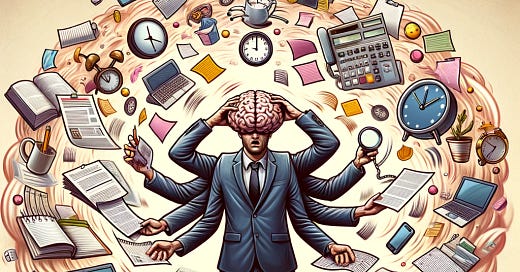Thank you for subscribing. I need a place to write longer pieces and more frequently and more of my thoughts than my other two newsletters.
What is on my mind today?
Today, I want to talk about how the therapeutic community is failing ADHD people.
Understanding Mindset
At its core, mindset encompasses our beliefs and attitudes, shaping our perceptions and approach to life's hurdles. It's the lens through which we view ourselves and our capabilities. We know mindset is critical to whether you live a happy life.
Through my 29 years of practice as a therapist, I've observed a particular mindset prevalent among children, teens, and adults with ADHD.
They often view themselves as inherently flawed, defective, and distrustful of their ability to be happy or succeed. They also believe that if they tried harder, weren't lazy, or could somehow summon motivation, they could be 'normal' — manage time better, keep up with those around them, be accepted socially, or stop forgetfulness.
Internalized Stigma
We call this internalized stigma.
Internalized stigma refers to the process by which people adopt and internalize society's negative perceptions and stereotypes about their condition. We don’t know nearly as much about this as we should when it comes to ADHD.
Shockingly, most mental health professionals still have this same problematic mindset. They view ADHD people as struggling with problematic behavior within their control. They treat ADHD people as if they need to become more neurotypical, reinforcing the internalized stigma that needs to be healed.
Therapists commonly aim to 'normalize' individuals with ADHD, a method reminiscent of conversion therapy. Yet, ADHD people don’t need correction; they require understanding, guidance on leveraging their neurology positively, and lessons in self-love and acceptance. Often, they also need healing from living in a world that’s traumatized them.
.
Lagging Treatment Methods
A major obstacle here is the slow progress of key educational institutions responsible for training ADHD care providers. Even though ADHD has been reclassified in the DSM as a neurodevelopmental disorder since 2013, these bodies still largely fail to support neurodivergent-affirming strategies. This maintains outdated treatment methods and slows the adoption of approaches that appreciate the neurodivergent mind.
Additionally, clinicians who embrace neurodiverse-affirming practices often face skepticism and criticism.
What is the reason for this? Is it possible that just as the profitability of ABA has influenced the treatment landscape for autism, similar economic factors might be shaping the adherence to traditional, behavior-focused approaches in ADHD care?
Therapists have a collective responsibility to confront our internal biases, yet too often, we find ourselves complicit in perpetuating these very prejudices, inadvertently causing harm and trauma.
This is a crucial and urgent issue that is not being addressed.
Despite significant advances in understanding neurodiversity, we choose to remain in the dark ages, entrenched in outdated methodologies that not only fail to heal but actively contribute to the trauma.
Why are therapists not at the forefront of pioneering inclusive, neurodiversity-affirming care?
I'm launching this newsletter to share insights and ideas about ADHD advocacy, a cause close to my heart. It's inspired by neurodivergent-affirming care principles, mainly learned from the autistic community, and aims to challenge and change the seemingly unseen misconceptions and obstacles faced by those with ADHD.
Thank you for joining me on this journey. I hope some of this will be helpful as I share my thoughts from inside the mind of a neurodivergent affirming therapist.







I also have chronic pain fibromylagia, chronic migraines and have the same experience. Such a struggle. We need the field to be more educated on neurodivergence. I think your post helps highlight for me the importance of educateing therapits on neurdivergence. This is the issue. I think this should be a focus of my work perhaps, educating therapists who are interested. Maybe I will work on focusing my efforts here
I am also an LCSW and am AuDHD. I have worked as a case manager with HIV individuals for the past 5 years. I have recently come to realize that a very large portion of my aging HIV survivors are neurodiverse. Especially with ADHD and as they age they are also showing signs of Hoarding Disorder. This trajectory is tragic. The entire world would rather throw my hoarding disorder clients on the street because of the massive judgement people have on hoarding and the complete misunderstanding of ADHD burnout, especially when facing multiple physical health problems that come with aging and having HIV. I just can’t believe that the state of CA would rather throw my clients on the street for having a cluttered house and deem them “lazy” or “disgusting” and not provide help to keep them housed. The system traumatizes me every single day. Now I am starting Telehealth practice at home and my first client is a TAY and diagnosed with BPD when he has a childhood DX of ADHD! How, HOW can we help? The trajectory for our kind is so so dismal. We need strengths-based trauma informed therapies that normalize the ADHD brain and help strengthen their ability to work with their brains and to be proud. IDK if you feel this way, but I seriously think that a lot of the Cluster B personality disorders are people with untreated ADHD and autism. Our trauma response, intense feelings and RSD all come together to create these coping skills as kids and grow into personality disorders. Just my own observation, but it really gets to me.